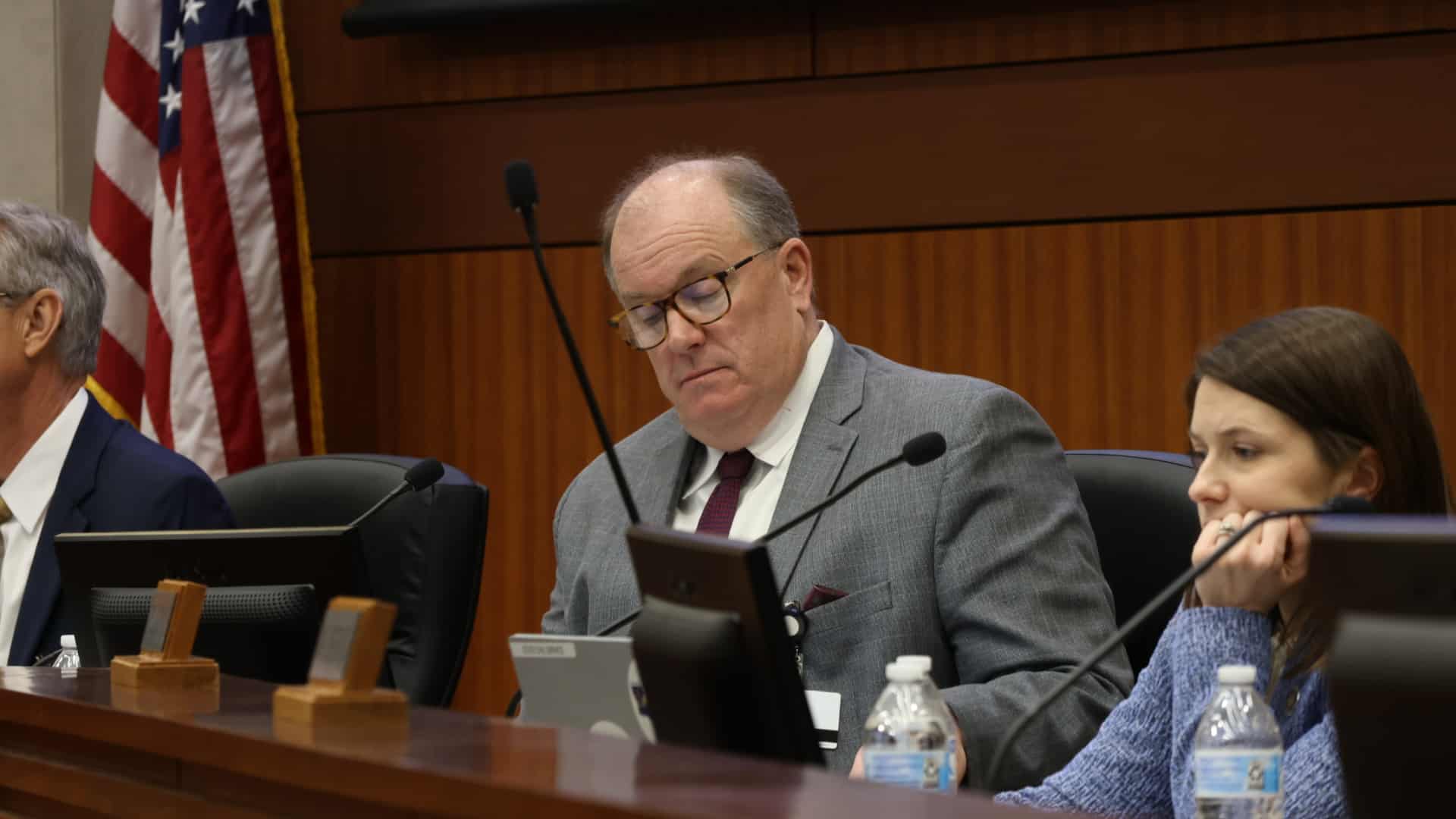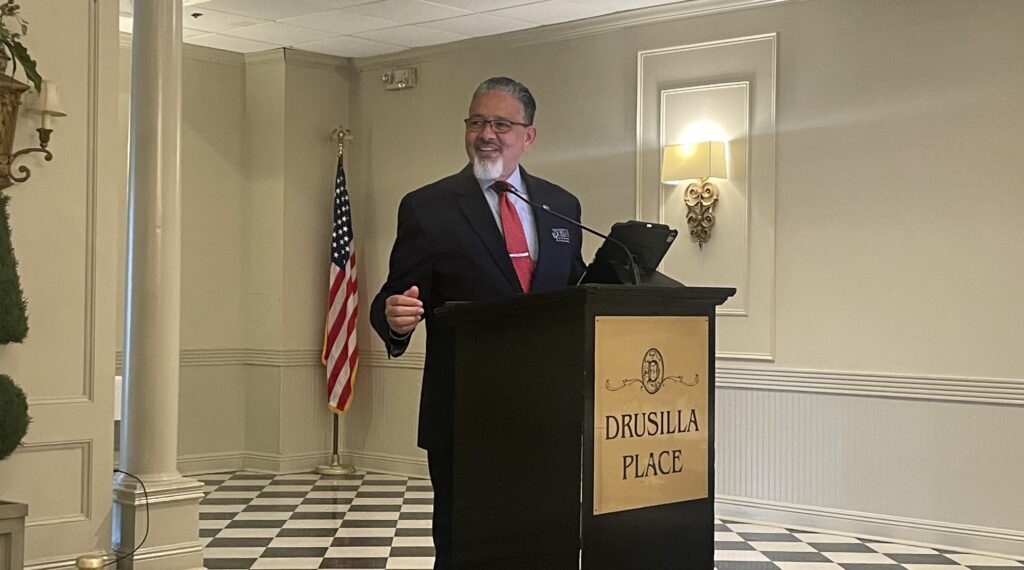News from the South - Louisiana News Feed
Gov. Landry fails to remove civil service protections from 900 state jobs • Louisiana Illuminator

Gov. Landry fails to remove civil service protections from 900 state jobs
by Wesley Muller, Louisiana Illuminator
February 10, 2025
Gov. Jeff Landry has yet to explain or defend his recent attempt to revoke civil service classifications from 900 state job positions, a move some fear would inject politics into the state government’s workforce.
The Louisiana State Civil Service Commission has denied a request from Landry to remove its protected status from any future hirings for 394 attorney and 506 engineer positions in state government, many of them within the Department of Transportation and Development (DOTD). The proposal would not have affected anyone currently employed in those positions.
Conditions for terminating a classified civil servant are multilayered and stringent, requiring due process and the right to an appeal if the employee feels they were unjustifiably let go.
The commission’s 4-2 decision Wednesday followed a lengthy discussion when some of the commissioners were skeptical about what they saw as an unusual, short-notice request with potentially far-reaching consequences.
Commissioner D. Scott Hughes addressed two high-ranking members of the Landry administration in attendance: special counsel Emily Andrews and Deputy Commissioner of Administration Patrick Goldsmith.
“Why today?” Hughes asked. “Why are we here today? Why is this an emergency? Why did I get something last week to change 900 job titles, job descriptions, in some cases, whole job departments?”
Goldsmith argued the request is not about politics but about recruitment and employee turnover.
“We’re trying to move at the speed of business,” Goldsmith said. “We’re trying to get things done.”
The state is having trouble finding and keeping qualified employees, particularly engineers, and the governor’s office believes it would be easier to recruit for those positions if they were unclassified, Goldsmith said. Unclassified state employees do not have Civil Service protections and can be fired “at-will” for no reason.
Removing classified Civil Service status from the 900 attorneys and engineers would eliminate the state pay schedule that determines their compensation. Goldsmith said these salary caps, largely based on working experience in state government, have hindered the administration’s ability to hire qualified professionals.
“I’m tired of making offers, and they just laugh at us,” Goldsmith said.
The governor’s office did not respond to multiple requests for comment for this report.
It’s unclear whether the state’s many agency heads were in support of or even aware of Landry’s request. The DOTD did not respond to multiple requests for comment sent to spokesman Rodney Mallett.
Ahead of last week’s commission meeting, the governor’s only communication about his plans was a one-page letter he submitted to the Civil Service Commission with his request. Dated Jan. 29, the letter offered no reasons or explanations for a proposal that came on the heels of President Donald Trump’s executive order revoking civil service protections from tens of thousands of federal employees. The U.S. Office of Personnel and Management issued guidelines on Jan. 27 to carry out Trump’s directive.
Hughes said the commission might not be able to protect the classified civil service system for much longer, explaining that he believes Louisiana voters may ultimately be asked whether to preserve it or convert it into some new system.
By suggesting that “the people” might have to decide, Hughes was referring to a state constitutional amendment, which would need the support of two-thirds of the Louisiana Legislature to appear on an election ballot for voter consideration.
In a phone interview last week, state Senate President Cameron Henry, R-Metairie, expressed support for the governor’s request and said it has become too difficult for an agency to fire a classified civil servant even when the termination is justified. He agreed that a constitutional amendment will probably be necessary.
Landry tried unsuccessfully to gain legislative support for a constitutional amendment last year that proposed similar changes. That amendment would have given state lawmakers more control over state employee classifications and would have given Landry more power to decide the make-up of the Civil Service Commission.
The modern civil service is based on reforms that began at the federal level in the late 1800s to correct the abuses of what was then called the “spoils system,” according to a 1946 government publication. Under the spoils system, whichever political party was in power controlled all the government jobs and handed them out in exchange for kickbacks and political loyalty.
“Whenever a different party or administration came into control, it fired at will the government employees appointed during the preceding regime,” the publication states. “Then it distributed their jobs to its own loyal supporters in accordance with the value of their services to the party.”
In Louisiana, the State Civil Service Commission is composed of seven commissioners who serve overlapping six-year terms. The governor appoints six of the members from a list of nominees chosen by the presidents of the state’s major private universities. The seventh commissioner is elected from among the state’s civil service employees.
Codi Plaisance, a DOTD engineer who is the elected state employee on the commission, spoke against the governor’s request, sharing written concerns she received from her fellow employees.
Because unclassified workers can be subject to political punishment and coercion, removing such a large number of engineers from the classified service could create ethical conflicts and unnecessary risks to the public, she said.
“Adding political influence to engineering decisions is dangerous and may very likely result in harm to life and property,” Plaisance said, citing one state employee’s concerns.
Administration officials pushed back against that premise, noting the change would apply only to future hires and not affect any current employees.
Andrews, the governor’s special counsel, cited state statutes she said protect employees by allowing them to file a lawsuit if they are subjected to illegal political coercion or retaliation.
Hughes countered by saying he found that argument unconvincing. Simply allowing an employee to file a lawsuit when their rights are violated, he said, is not a form of protection.
Andrews said the governor’s request was limited to lawyers and engineers because those jobs require professional licenses from their own regulatory oversight boards. State licensing boards for engineers and lawyers already exist to handle ethical matters involving those professionals, and those boards would be sufficient in preventing state lawyers and engineers from engaging in any unethical conduct, she said.
However, those boards cannot protect their licensees in ways the Civil Service Commission can protect classified employees. For example, a licensing board could not reverse the politically-motivated termination of a lawyer from a state agency.
Also, politics plays a role in determining the membership on one of the professional oversight boards; the governor appoints every member of the Louisiana Professional Engineering and Land Surveying Board.
Hughes, whom former Gov. John Bel Edwards appointed to the Civil Service Commission, questioned the timing and manner of Landry’s request. Reclassification requests typically come from individual agencies, not the governor’s office, he said, and they also come on a case-by-case basis specific to one or a few positions.
“I can’t imagine doing it one at a time,” Goldsmith said. “That would just be a bureaucratic nightmare
Ultimately, the governor’s plan is to have a state workforce of fewer, higher paid and better qualified employees, Goldsmith said.
A state agency can offer higher salaries to unclassified employees, but only if it has the money in its budget.
“Working for DOTD for so long, I always heard that we have budget issues,” Plaisance said. “Where is this [money] coming from? … If we make them unclassified, the budget just magically appears?”
Hughes offered to do a “test case” in which the commission reclassifies some of the positions to see if it solves the turnover problem. Andrews and Goldsmith declined, saying their current request involving 900 employees was the test case.
GET THE MORNING HEADLINES.
Louisiana Illuminator is part of States Newsroom, a nonprofit news network supported by grants and a coalition of donors as a 501c(3) public charity. Louisiana Illuminator maintains editorial independence. Contact Editor Greg LaRose for questions: info@lailluminator.com.
News from the South - Louisiana News Feed
Easter Weekend: Muggy, warm, and windy

SUMMARY: Easter Weekend will be warm, muggy, and breezy, with mostly cloudy skies and temperatures in the low 80s. Current conditions are in the low 70s, making it a sticky day for events like the Crescent City Classic. While there’s a slight chance of rain on Sunday, most of the day will remain dry. Winds from the southeast could gust near 30 mph. Next week, a front will bring increased rain chances and storms starting Monday, with unsettled conditions continuing into Tuesday and Wednesday. Despite this, warm temperatures in the 80s will persist throughout the week.

Easter Weekend looks very nice! It will be hot, humid, and windy with high temperatures in the lower 80s both afternoons. More clouds will be around with some breaks
News from the South - Louisiana News Feed
Vicente Fernandez and Freddy Fender join National Recording Registry

SUMMARY: This year, Vicente Fernandez’s “El Rey” and Freddy Fender’s “Before the Next Teardrop Falls” were inducted into the National Recording Registry, alongside Lin-Manuel Miranda’s *Hamilton* album. Congressman Joaquin Castro has championed the inclusion of more Latino artists in the registry, noting that Latino representation is only 5%. Over the last three years, with input from constituents, Castro has successfully nominated 30 songs and albums, including iconic Latino tracks. He advocates for more Latino contributions to be recognized, including Selena’s work. Castro will continue gathering nominations for 2026, aiming to better reflect Latino cultural influence in the registry.

Each year since 2000, the Library of Congress has selected influential songs and albums to be preserved in the National Recording Registry. This year, three Latino artists were inducted — two of them with deep roots in Latino culture and South Texas.
News from the South - Louisiana News Feed
Q&A with University of Louisiana System President Rick Gallot on higher education

by Piper Hutchinson, Louisiana Illuminator
April 18, 2025
This is an interview with University of Louisiana System President Rick Gallot that took place earlier this month about how the legislative session and federal changes will impact higher education in Louisiana. It has been edited for length and clarity.
You can also listen to a version of this interview on our new podcast The Light Switch.
Piper Hutchinson: What do you think is coming for higher education this session?
Rick Gallot: I think certainly starting with a standstill budget is always better than starting with a proposed cut. So, you know, we’re certainly very grateful for that. I think there’s a lot of uncertainty, coming out of Washington and with the constitutional amendments that did not pass, obviously that has created some angst in terms of what do we do now, right? And so I think there is, again, just an overall level of uncertainty that we’ll see it … kind of play out over time.
I think if you look at the increased revenue from the sales, sales taxes and other things, we’re certainly not in a real bad spot right now as a state in terms of our finances. So I’m still optimistic that we will work through the challenges in the session, and we will come out good on the other side.
Hutchinson: Looking at the bills that we have so far, what do you think is going to be the most impactful for higher education?
Gallot: It’s hard to say, and when you look at what’s filed versus what ultimately makes it through the process; all bills filed on the front end don’t always make it. Rep. (Emily) Chenevert has come back with another diversity, equity and inclusion bill. We will certainly have to see how that plays out. The bill she had last year started one way and ended up another. … Certainly with all other higher ed leaders, she was very receptive to meeting with us and working through some of those challenges last year. At the end of the day, I think the budget is always going to be the main focus that could impact the trajectory going forward.
Hutchinson: There’s one bill that’s going to have a big impact for your system, talking about transferring UNO back to the LSU System. What should we expect on that front?
Gallot: For me personally, it’s a full-circle moment. I was in the house when UNO was transferred from LSU to the University of Louisiana System. You know, I just want what’s best for the students, for the campus community at the University of New Orleans. It is a legislative prerogative. They have the authority to transfer universities from one system to the other. So if this legislation is successful, we will certainly do our part to ensure that it is a seamless transition. We will work with LSU, with Board of Regents and with the legislature to ensure that the transition is as smooth as it could possibly be.
Hutchinson: What’s that like for you [as a former legislator] during the legislative session, being kind of outside the rails?
Gallot: Well, I certainly have a lot of respect for our legislators and the sacrifices they all make in serving. I’m a huge fan of Stephen Covey’s “Seven Habits,” and one of those is: “Seek, first to understand then to be understood.” And so I think that’s helpful to understand the pressures that our legislators are under, knowing that there’s a lot that they have to balance. I think it’s helpful, quite frankly. And I don’t think I burned any bridges while here.
I mean, I did oversee redistricting, so maybe I did [burn] one or two. But for the most part, I still have good relationships with many of my former colleagues … who are still there. I’m grateful to have the opportunity to be a part of the process but from this side.
Hutchinson: There has been a little bit of controversy in the LSU System lately, that’s reignited these conversations about curbing tenure. What are you hearing on that front, and what would that mean for higher education as a whole if they did take an axe to tenure?
Gallot: Going back to COVID, and you think about faculty members, who go through the process of, not only a bachelor’s and a master’s and a terminal degree. You know, they get hired, they’re on a tenure track, they’re researching, they’re writing, they’re building their portfolio, and at the appropriate time they apply for tenure. I think we have to respect that process.
I think it is one that is deeply rooted in higher education, and so I think we certainly have to respect faculty and that they have earned this.
Now, having said that, it’s always one or two bad apples that will spoil the barrel, as they say. I don’t know that simply doing away with tenure is the answer.
If the legislature passes something, then we, as a state system, will certainly abide by whatever changes may be made. I think we want accountability at all levels, that we want our students to be in the best position to learn. We want our faculty to be in the best position to teach, and that our students would graduate and go out and make a difference in society. So we’ll certainly be watching it closely, and hopefully we will see thoughtful debate throughout the process. And again, with whatever the ultimate result is, we will work with it.
Hutchinson: I can’t not talk about what’s going on at the federal level. We’re talking about cutting research funding. There are concerns about immigration and graduate students, and certainly tariffs could increase expenses for higher education. How is the UL System adapting to all of this?
Gallot: Right now there’s so much uncertainty just across the board. Whether it’s the potential loss of research funding and indirect cost, for instance, universities build their budgets based upon what they believe the revenue stream will be from these research grants. I’m hopeful that we will sort of get through this period of uncertainty, and we will see things sort of settle down to be a little more predictable. But you know, at the same time, we will have to adjust if the rules are changed. If the funding formulas are changed, we will just have to adapt. We always have and we always will.
GET THE MORNING HEADLINES.
YOU MAKE OUR WORK POSSIBLE.
Louisiana Illuminator is part of States Newsroom, a nonprofit news network supported by grants and a coalition of donors as a 501c(3) public charity. Louisiana Illuminator maintains editorial independence. Contact Editor Greg LaRose for questions: info@lailluminator.com.
The post Q&A with University of Louisiana System President Rick Gallot on higher education appeared first on lailluminator.com
-

 Mississippi Today6 days ago
Mississippi Today6 days agoLawmakers used to fail passing a budget over policy disagreement. This year, they failed over childish bickering.
-

 Mississippi Today6 days ago
Mississippi Today6 days agoOn this day in 1873, La. courthouse scene of racial carnage
-

 Local News6 days ago
Local News6 days agoSouthern Miss Professor Inducted into U.S. Hydrographer Hall of Fame
-

 News from the South - Alabama News Feed5 days ago
News from the South - Alabama News Feed5 days agoFoley man wins Race to the Finish as Kyle Larson gets first win of 2025 Xfinity Series at Bristol
-

 News from the South - Alabama News Feed5 days ago
News from the South - Alabama News Feed5 days agoFederal appeals court upholds ruling against Alabama panhandling laws
-

 News from the South - Florida News Feed7 days ago
News from the South - Florida News Feed7 days agoSevere weather has come and gone for Central Florida, but the rain went with it
-

 News from the South - Florida News Feed6 days ago
News from the South - Florida News Feed6 days agoJacksonville University only school with 2 finalist teams in NASA’s 2025 Human Lander Challenge
-

 News from the South - Alabama News Feed7 days ago
News from the South - Alabama News Feed7 days agoBellingrath Gardens previews its first Chinese Lantern Festival








































